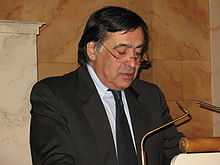Leoluca Orlando
| Leoluca Orlando | |
|---|---|
 | |
| Mayor of Palermo | |
| Incumbent | |
| Assumed office 22 May 2012 | |
| Preceded by | Luisa Latella |
| In office 3 December 1993 – 16 December 2000 | |
| Preceded by | Vittorio Piraneo |
| Succeeded by | Guglielmo Serio |
| In office 9 July 1990 – 14 August 1990 | |
| Preceded by | Andrea Gentile |
| Succeeded by | Domenico Lo Vasco |
| In office 16 July 1985 – 12 March 1990 | |
| Preceded by | Gianfranco Vitocolonna |
| Succeeded by | Andrea Gentile |
| Personal details | |
| Born | August 1, 1947 Palermo |
| Nationality | Italian |
| Political party | Movimento 139 |
| Relations | Married |
| Alma mater | University of Palermo |
| Occupation | Politician |
| Religion | Roman Catholicism |
Leoluca Orlando (born 1 August 1947), is an Italian politician and current Mayor of Palermo. He was also mayor of the city in 1985–1990 and 1993–2000.[1] He is best known for his strong opposition to the Sicilian Mafia, but also for his vocal criticism of Giovanni Falcone, a leading prosecuting magistrate murdered by Cosa Nostra in 1992.
Biography
Orlando was born in Palermo. He studied in Germany and the UK, graduated in jurisprudence and worked as lawyer and professor at the University of Palermo.
He was a member of Christian Democracy (DC), in the left wing of the party. He entered politics in 1976 as legal adviser to Christian Democratic reformer Piersanti Mattarella, who became president of the Sicilian Region in 1978. The two men set out to break the Mafia's hold on the island, transferring budget authority from the corrupt regional government back to the cities and passing a law enforcing the same building standards used in the rest of Italy, thereby making the Mafia's building schemes illegal.[2] In retaliation, the Mafia killed Mattarella in January 1980.
The brother of Mattarella and other associates urged him to run for the Palermo municipal council, he ran successfully, and was elected mayor by the town council in 1985.[2] From 1985-1990 he was elected mayor of Palermo, and received many threats as a result of his open opposition to the power of the Mafia in the city. He was re-elected as mayor in 1993 with 75.2% of the vote. In 1992 he was also elected to the Italian Chamber of Deputies. Two years later he became a member of the European Parliament.
After the dissolution of DC, he founded a popular movement called The Network ("La Rete"), which in 1999 joined with Romano Prodi's Democrats. In 2001 he was among the founders of The Daisy, an Italian party currently including most of the former left-wing members of DC.
Since 2000, he has been the President of the "Sicilian Renaissance Institute" a non-profit organization dealing with the promotion of economy and culture of lawfulness and Human rights.[3]
In December 2000 he resigned from the position of mayor and was a candidate for the presidency of the autonomous region of Sicily. He was, however, defeated by the centre-right candidate Salvatore Cuffaro. In 2006 he was expelled from the Daisy party, after having shown his full support for the candidacy of Rita Borsellino in the Sicilian presidential centre-left primary election, contrary to the line of his party that supported its member Ferdinando Latteri. He subsequently joined the Italy of Values of Antonio Di Pietro with whom he was elected at the Italian Chamber of Deputies. He has been the President of the Parliamentary Commission for Regional affairs.
In April 2008 he was re-elected to the Italian Chamber of Deputies.
On May 2007 he ran as centre-left candidate for mayor of Palermo, after having won the centre-left primary election in a landslide with about 72% of the votes. He however lost to incumbent Diego Cammarata of the House of Freedoms, who obtained about 53% of votes compared with Orlando's 45%.[4] Following the results, Orlando denounced massive electoral frauds and asked for the annulment of the vote.[5] His accusations are currently under evaluation by both the Penal and the Administrative Tribunals of Sicily.
In March 2012 he announced he will run as independent candidate as Mayor of Palermo at the elections in May 2012, after having unsuccessfully supported Rita Borsellino's mayoral bid in a controversial primary election won by his former protégé Fabrizio Ferrandelli. In the first round, held on 5 May 2012, he was the most voted candidate with 48% of votes despite being only supported by his own Italy of Values and a number of minor left-wing parties (Federation of the Greens and Federation of the Left). He took part in the final round against second-placed Ferrandelli and on 21 May he won the runoff with 72% of the vote.[6]
References
- ↑ "Sindaci e commissari dal 1861 a oggi". Comune di Palermo. 22 May 2012. Retrieved 23 May 2012.
- ↑ 2.0 2.1 Mob Rule - Fighting the Mafia and Renewing Sicilian Culture - Review, National Review, 1 October 2001
- ↑ The website of the Sicilian Renaissance Institute
- ↑ (Italian) Results
- ↑ Center-right wins Sicily mayorships; Berlusconi says it's the beginning of the end for Prodi, The Associated Press, 14 May 2007
- ↑ "Orlando vince con il 70 per cento". La Repubblica (in Italian). 21 May 2012. Retrieved 21 May 2012.
External links
- (Italian) Official website of Leoluca Orlando
|
| ||||||||||||||||||||||||||||||||||||||||||